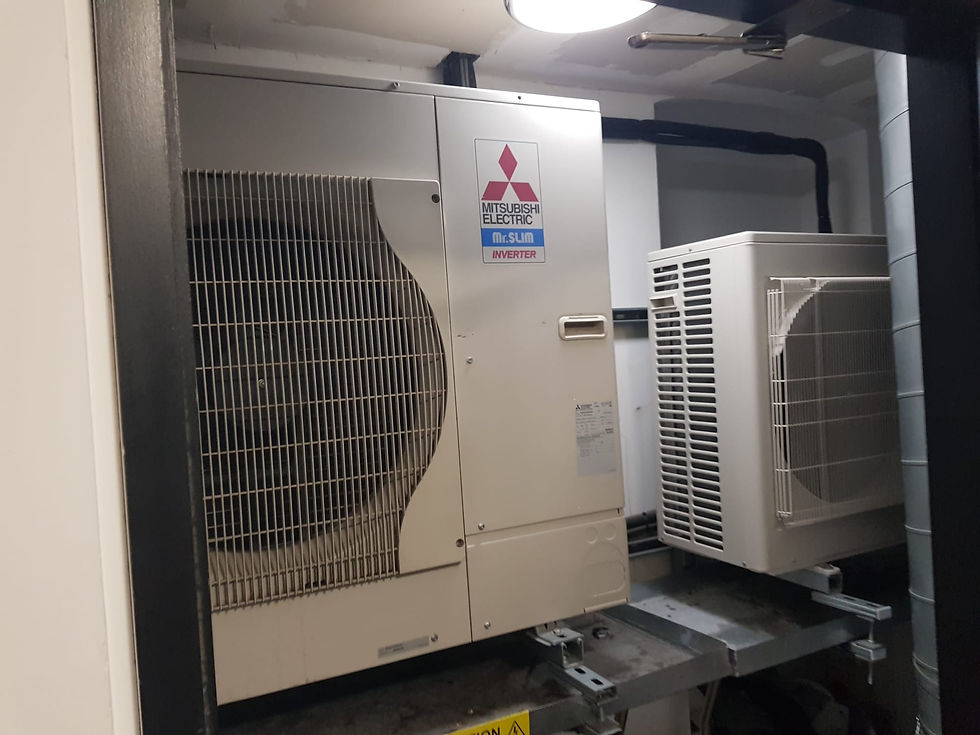Ductless Mini-Split Systems: A Comprehensive Guide
- Feb 26, 2024
- 3 min read

Ductless Mini-Split Systems: A Comprehensive Guide
Ductless mini-split systems have emerged as versatile and efficient options for both residential and commercial spaces. Offering targeted comfort control, energy efficiency, and easy installation, these systems have gained popularity among homeowners and businesses alike. In this comprehensive guide, we delve into the workings, benefits, installation process, and maintenance of ductless mini-split systems to help you make informed decisions about your heating and cooling needs.
Understanding Ductless Mini-Split Systems
Ductless Mini-Split systems consist of two main components: a condensing unit outdoors and one or more indoor air handling units. Unlike traditional HVAC systems that rely on ductwork to distribute conditioned air, these deliver air directly into specific rooms or zones.
How Do Ductless Mini-Split Systems Work?
These systems operate on the same basic principles as traditional air conditioners and heat pumps but with a simplified setup. The outdoor unit compresses and circulates refrigerant through the connecting pipes to the indoor units. Inside, the refrigerant absorbs or releases heat, depending on whether the system is in cooling or heating mode. The indoor units then blow air over the coils distributing conditioned air into the space.

Benefits of Ductless Mini-Split Systems
Customised Comfort
Ductless mini-splits allow for individualised temperature control in different areas of your building, catering to varying comfort preferences
Energy Efficiency
As they don’t rely on ductwork, ductless systems avoid the energy losses associated with air ducts, resulting in higher energy efficiency and lower utility bills.
Easy Installation
Installation is less invasive compared to traditional HVAC systems, as it doesn’t require ductwork. Indoor units can be wall mounted or ceiling cassette style, offering flexibility in placement.
Zoning Capabilities
With multiple indoor units connected to a single outdoor unit, ductless mini-split enable zoning, meaning you can set different temperatures for different zones or rooms, maximising comfort and efficiency.
Improved Indoor Air Quality
Ductless systems typically feature advanced filtration to remove dust, allergens, and other pollutants from the air, promoting healthier indoor air quality.
Installation Process
Assessment
A professional HVAC technician assess your space to determine the number and placement of indoor units needed for your preferred comfort and efficiency.
Mounting Indoor Units
Indoor Units are mounted on walls or ceilings in designated areas, typically requiring a small hole for the refrigerant and electrical lines.
Connecting Components
Refrigerant and electrical lines are connected between the outdoor and indoor units, usually through a small conduit that runs through an exterior wall.
Outdoor Unit Installation
The outdoor condensing unit is installed in a suitable location outside of the building, typically on a concrete pad or mounted to the wall.
Commissioning
After installation, the system is thoroughly checked and commissioned to ensure proper operation and performance.
Maintenance Tips
Regular Cleaning
Clean or replace air filters as recommended by the manufacturer to maintain proper airflow and indoor air quality.
Inspect Outdoor Unit
Periodically check the outdoor unit for leaves or debris and ensure adequate clearance around the unit for optimal airflow.
Professional Maintenance
Schedule annual maintenance with a qualified HVAC technician to inspect the system, check refrigerant levels, and address any potential issues before they escalate.
Keep Indoor Units Clear
Ensure indoor units are free from obstructions that could block airflow, such as furniture or curtains.
Monitor Performance
Pay attention to any changes in performance, such as decreased cooling or heating capacity and contact a professional HVAC technician to address the issues promptly.


Ductless mini-split systems offer a flexible, energy efficient solution for heating and cooling homes, offices and other spaces. With their customsiable comfort control, easy installation and low maintenance requirements, they provide a reliable and cost effective HVAC solution for modern living. If you’re considering upgrading your heating and cooling system, ductless mini-splits are certainly worth exploring for their numerous benefits and advantages.



Comments